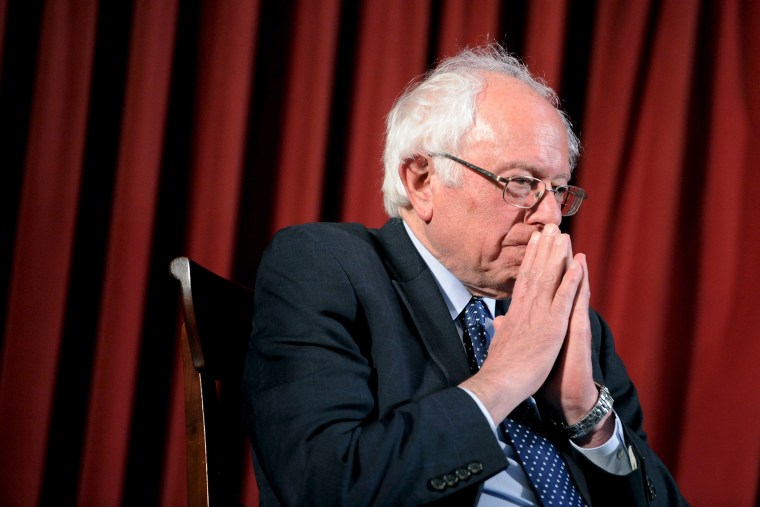It's no secret that Bernie Sanders' fundraising juggernaut has amazed much of the political world, exceeding Hillary Clinton's financial support over each of the last few months. The Clinton campaign has been quick to note, however, that the Democratic frontrunner has spent the year raising millions of dollars, not just for her candidacy, but also for the Democratic Party and more than 30 state Democratic parties, in the hopes of building a broader foundation for the 2016 elections.
The Vermont independent, meanwhile, has collected stunning sums for his own campaign operation, but so far in 2016, Sanders hasn't raised any money for the Democratic Party, any of the state Democratic parties, or even any specific Democratic candidates. When Rachel asked in a recent interview whether that might eventually change, the senator replied, "We'll see."
But Jane Sanders said something interesting on the show last week. Asked whether her husband might be willing to help other campaigns financially, she said Sanders would definitely lend a hand -- for "the right candidates."
Yesterday, we got a better sense of what that means. Politico reported:
Bernie Sanders is raising money for a trio of progressive House candidates who have endorsed him, a move that comes just weeks after he faced friendly fire for not committing to fundraise for down-ballot Democrats. [...] The trio of candidates -- New York's Zephyr Teachout, Nevada's Lucy Flores, and Washington state's Pramila Jayapal -- is running in primaries that pit them against more establishment-aligned foes.
In a fundraising solicitation that went to donors yesterday, Sanders wrote, "I've told you throughout this campaign that no candidate for president, not Bernie Sanders, not the greatest president you could possibly imagine, can take on the billionaire class alone. When I am elected president, I am going to need progressives in Congress who are willing to continue the fight we started in this campaign."
The pitch makes the case for Teachout, Jayapal, and Flores, and the letter included a link to a fundraising page in which donors were offered a choice: make a contribution that would be divided evenly four ways (the three congressional candidates and Sanders), or specify a personalized allocation for the contribution.
And in some ways, this new endeavor is itself emblematic of the larger Democratic fight.
Zephyr Teachout is running in New York's 19th congressional district, which is currently held by a retiring Republican. Democratic officials are generally optimistic about Will Yandik, a local city councilman, but Sanders is now raising money for his more liberal primary rival.
Lucy Flores is running in Nevada's 4th congressional district, which is also currently held by a Republican. Many Democratic officials have rallied behind state Sen. Ruben Kihuen, but Sanders is now raising money for his more liberal primary rival.
Pramila Jayapal is running in Washington's 7th congressional district, where a Democratic incumbent is retiring. Many local Democratic leaders are backing Joe McDermott, a King County council member, but Sanders is now raising money for his more liberal primary rival.
It's as if there's a pattern emerging.
The big news here, of course, is the shift itself: Sanders was raising money exclusively for himself, and now he's not. This, to a degree, brings him more in line with Clinton's approach of supporting other Democrats seeking other offices.
But even here, there's a stark difference between the two. Team Clinton is supporting the national and state parties generally, while Team Sanders is supporting more specific allies. It's a matter of perspective which approach is more compelling.
That said, I'd be interested in hearing more from Sanders about his long-term intentions in this area. After all, the president -- any president -- is practically by definition also the head of his or her party. What kind of role would Sanders envision for himself with regard to the DNC and related campaign committees? Would Democratic candidates who only agreed with parts of Sanders' agenda still be able to count on support from a Sanders White House? As the convention draws closer, they're the kind of questions superdelegates seem likely to ask.
